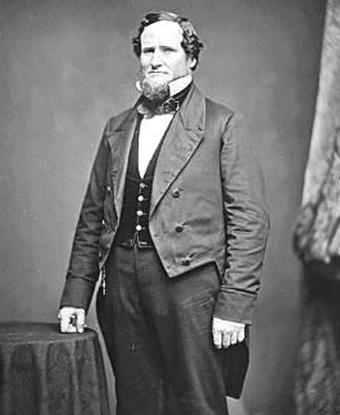Last updated: June 18, 2015
Person
William Barksdale

Library of Congress
From the Peninsula to Maryland: Barksdale's role in the summer of 1862
Though born in Tennessee, in 1853 William Barksdale was elected to represent the state of Mississippi in Congress, where he quickly became known for his unwavering pro-slavery and state's rights political views. When Mississippi seceded for the Union in 1861 Barksdale resigned from Congress and accepted a commission as an officer in the Mississippi Militia. On May 1, 1861 he was promoted to Colonel and given command of the 13th Mississippi Infantry, which he led at the First Battle of Manassas (Bull Run) and during the Peninsula Campaign.
Barksdale assumed command of the brigade when his brigade commander, Brigadier General Richard Griffith, was mortally wounded at the Battle of Savage's Station on June 29, 1862. After Barksdale led the brigade in an attempt to take the Union position on Malvern Hill the brigade quickly became known as "Barksdale's Mississippi Brigade" and Barksdale was promoted to brigadier general on August 12, 1862.
Barksdale and his Brigade were sent to the Harpers Ferry region following the Peninsula Campaign and so did not participate in the Second Battle of Manassas. He and his men did, however, fight at the battles of Harpers Ferry and Antietam in the division of Major General Lafayette McLaws.
At Harpers Ferry Barksdale was a part of the fighting at Maryland Heights, sent there to protect the rear and block Union retreat. Gaining control of Maryland Heights gave the Confederates a great advantage in the battle and was a key element in securing their victory. At Antietam Barksdale and the rest of McLaws' Division fought in the West Woods, beginning near daybreak on September 17.
Following Antietam, Barksdale went on to fight at Gettysburg, where he was mortally wounded and died from his wounds on July 3, 1863. It is reported that his last words were: "I am killed! Tell my wife and children that I died fighting at my post."
